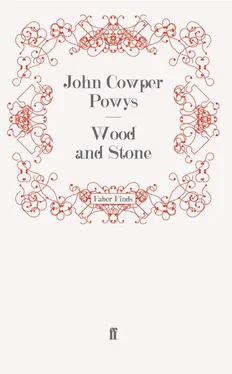“Yes, it is a lovely day again,” said the old lady, leading her visitor to a seat and placing herself by his side. “But what is our naughty Monsignor doing, playing truant from his consistory? I thought you would be in London this week — at the Eucharist Conference your people are holding? Is it to the loveliness of the weather that we owe this pleasant surprise?”
One almost expected — so formal and old-fashioned were the two interlocutors — that Mr. Taxater would have replied, in the tone of Ivanhoe or the Talisman, “A truce to such jesting, Madam!” No doubt if he had, the lady would hardly have discerned any anachronism. As a matter of fact he did not answer her question at all, but substituted one of his own.
“I met Vennie in the village,” he said. “Do you think she is happier now, in her new English circle?”
“Ah! my friend,” cried the old lady, in a nervous voice, “it is of Vennie that I have been thinking all this afternoon. No, I cannot say I think she is happier. I wonder if it is one thing; and then I wonder if it is another. I cannot get to the bottom of it and it worries me.”
“I expect it is her nerves,” said the diplomatist. “Though the sun is so warm, there has been a constant east wind lately; and, as you know, I put down most of our agitations to the presence of east wind.”
“It will not do, Mr. Taxater; it will not do! It may be the east wind with you and me. It is not the east wind with Vennie. Something is troubling her. I wish I could discern what it is?”
“She isn’t by any chance being vexed by some theological dispute with the Vicar, is she? I know how seriously she takes all his views. And his views are, if I may say so, decidedly confusing. Don’t misunderstand me, dear lady. I respect Mr. Clavering and admire him. I like the shape of his head; especially when he wears his beretta. But I cannot feel much confidence in his wisdom in dealing with a sensitive child like your daughter. He is too impulsive. He is too dogmatic. He lives too entirely in the world of doctrinal controversy. It is dangerous”; here Mr. Taxater luxuriously stretched out his legs and lit a cigarette; “it is dangerous to live only for theology. We have to learn to live for Religion; and that is a much more elaborate affair. That extends very far, Mrs. Seldom.”
The old lady let her stick slide to the ground and clasped her hands together. “I want to ask you one thing, Mr. Taxater. And I implore you to be quite direct with me. You do not think, do you, that my girl is tending towards your church — towards Rome? I confess it would be a heavy blow to me, one of the heaviest I have ever had, if anything of that kind happened. I know you are tolerant enough to let me speak like this without scruple. I like you , my dear friend—” Here a soft flush spread over Valentia’s ivory-coloured cheeks and she made a little movement as if to put her hand on her companion’s arm. “I like you yourself, and have the utmost confidence in you. But Oh, it would be a terrible shock to me if Vennie became a Roman Catholic. She would enter a convent; I know she would enter a convent and that would be more than I could bear.” The accumulated distress of many years was in the old lady’s voice and tears stood in her eyes. “I know it is silly,” she went on as Mr. Taxater steadily regarded the landscape. “But I cannot help it. I do so hope — Oh, I can’t tell you how much — that Vennie will marry and have children. It is the secret burden of my life, the thought that, with this frail little thing, our ancient race should disappear. I feel it my deepest duty — my duty to the Past and my duty to the Future — to arrange a happy marriage for her. If only that could be achieved, I should be able to die content.”
“You have no evidence, no authority for thinking,” said Mr. Taxater gravely, “that she is meditating any approach to my church, as you call it, have you?”
“Oh no!” cried the old lady, “quite the contrary. She seems absorbed in the services here. She works with Mr. Clavering, she discusses everything with Mr. Clavering, she helps Mr. Clavering with the poor. I believe”—here Valentia lowered her voice; “I believe she confesses to Mr. Clavering.”
Francis Taxater smiled — the smile of the heir of Christendom’s classic faith at these pathetic fumblings of heresy — and carefully knocked the ashes from his cigarette against the handle of his cane.
“You don’t think, dear lady,” he said, “that by any chance — girls are curiously subtle in these little things — she is ‘in love,’ as they call it, with our nice handsome Vicar?
Valentia gave an involuntary little start. In her heart there rose up the shadow of a shadow of questioning, whether in this last remark the great secular diplomatist had not lapsed into something approaching a “faux pas.”
“Certainly not,” she answered. “Vennie is not a girl to mix up her religion with things of that sort.”
Francis Taxater permitted the flicker of a smile to cross his face. He slightly protruded his lower lip which gave his countenance a rather sinister expression. His look said, more clearly than words, that in his opinion there was no woman on earth who did not “mix up these things” with her religion.
“I have not yet made my request to you,” continued the old lady, with a certain nervous hesitation. “I am so afraid lest you should think it an evidence of a lack of confidence. It isn’t so! It really isn’t so. I only do it to relieve my mind;—to make my food taste better, if you understand? — and to stop this throbbing in my head.” She paused for a moment, and picking up her stick, prodded the gravel with it, with lowered face. The voices of not less than three wood-pigeons were audible from the apple-orchard. And this soft accompaniment to her words seemed to give her courage. Fate could not, surely, altogether betray her prayers, in a place so brooded over by “the wings of the dove.” In the exquisite hush of the afternoon the birds’ rich voices seemed to take an almost liturgical tone — as though they were the ministers of a great natural temple. To make a solemn request of a dear friend under such conditions was almost as though one were exacting a sacred vow under the very shadow of the altar.
So at least Valentia felt, as she uttered her serious petition; though it may well be that Mr. Taxater, skilled in the mental discipline of Saint Ignatius, knew better how to keep the distracting influences of mere “Nature,” in their proper secondary place.
“I want you faithfully to promise me,” she said, “that you will in no way — in no way at all — use your influence over Vennie to draw her from her English faith.” The old lady’s voice became quite husky in her emotion. “It would be dreadful to me to think, — I could not bear to think”—she went on, “that you should in the smallest degree use your great powers of mind to disturb the child’s present attitude. If she is not happy, it is not — Oh, I assure you, it is not — in any sense due to her being dissatisfied with her religion. It must be something quite different. What it is, I cannot guess; but it must be something quite different from that . Well, dear friend,” and she did now, quite definitely, lay her hand on his arm, “will you promise this for me? You will? I know you will.”
Francis Taxater rose from his seat and stood over her very gravely, leaning upon his cane.
“You have done well to tell me this, Mrs. Seldom,” he said. “Most certainly I shall make no attempt to influence Vennie. It would be indeed contrary to all that I regard as wise and suitable in the relations between us. I never convert people. I believe you will find that very few of those who are born Catholics ever interfere in that way. It is the impetuosity of new-comers into the church that gives us this bad name. They often carry into their new faith the turbulent theological zeal which distinguished them in their old one. I, at any rate, am not like that. I leave people alone. I prefer to watch them develop on their own lines. The last thing I should wish to do would be to meddle with Vennie’s religious taste. It would be a blunder as well as an impertinence. Vennie would be the first to resist any such proceeding. It would destroy her respect for me. It might even destroy her affection for me. It certainly would not move her. Indeed, dear lady, if I wished to plant the child’s soul irrevocably in the soil prepared by our good vicar I could not do anything more effective than try to persuade her of its deficiencies. No, no! You may rely upon me to stand completely aside in this matter. If Vennie were led to join us — which for your sake, dear Mrs. Seldom, I hope will never happen, — you may accept my word of honour it will be from her own spontaneous impulse. I shall make not the least movement in the direction you fear. That I can devoutly promise.
Читать дальше












